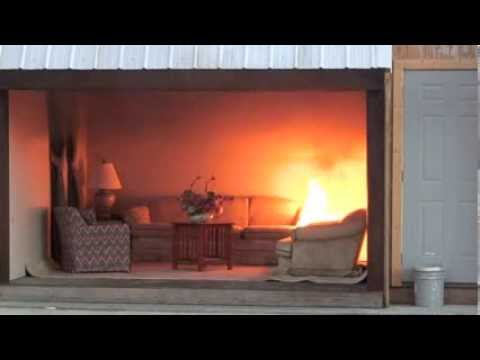In the UK its the opposite, health and safety rules prevent the ‘professional firefighters from live training in a hot box’ hence you could say seamen are trained to a much higher standard.
From this site:
The salvage team suspected that the explosion was the result of a release of gases that built up within the interior after the vessel’s fire dampers were closed.
The ship’s seventh deck was believed to have been the source of the fire shortly after the vessel completed loading operations, vessel operator Höegh Autoliners said.
The fire spread through several other levels up to the 11th deck and down to deck six, according to USCG Sector Jacksonville commander Captain Mark Vlaun.
JFRD Chief Keith Powers told local media on Friday that the vessel’s fire dampers have been shut in an effort to starve the fire of oxygen. He said that firefighters on board were dealing with zero visibility and enough heat to make the paint peel off the outside of the vessel.
Temperatures at lower deck levels remained in the range of 90 to 100 degrees Fahrenheit, and the response team hoped to contain the “complex” fire above deck six – away from machinery spaces and bunker tanks.
In the video it looks to me like pieces of the cargo hold vent are being blown off. There would be E/R vents aft of the stack but likely E/R exhaust vents are in the stack. The E/R supply vents would not vent outboard. Almost has to be a cargo hold vent.
My guess is it was a flashover type event. The ship’s crew might have been following emergency procedures and closed the vents before the firefighters arrived…
An enclosed space is not required for a flashover. In this training video most of one wall is missing, there’s just enough at the top to trap the hot gases
Forward to about 2:50 to see the flashover.
smoke explosion or fire gas ignition depending on the severity of the combustion process.
If by ‘hot box’ you mean a small room, I’m questioning the fact that UK rules prevent firefighters from training to fight fire in confined spaces.
Hot box is the steel building that simulates a ship, has about 6 levels and can be sealed when on fire.
As explained to me by the ex firefighters that run the fire part of Nautical centre in the UK where I did my firefighting in that steel building
Local firefighters do not use the Marine facility as they dont go into burning buildings, they hose them from the outside.
The joke they said was a chef on a cruise ship has done training a professional has not.
They did say the guys in the USA create a ventilation escape high up to draw smoke out and then enter
They all thought the US system was better.
One of the guys who had a whole 30+ years in local firefighting (and there are lots of fires in the UK from the crap old buildings) said neither him nor any fireman in his area, Kent, had ever saved anyone, he said they are either out when you arrive or inside and dead from the smoke.
I was curious about the term. I’ve trained for shipboard firefighting in the US in a steel structure simulating a ship but not with that many levels and it wasn’t called a hot box. Our FDs train in something like what you describe, several stories and shaped like a tall square box.
Professional large city firefighters are going to have far more experience fighting fires than ship’s crew. How many mariners have fought more than small fires? I ask at meetings, it’s very few.
Don’t know yet if it was an issue here but the fact that many fire departments in port cities are not well prepared for shipboard firefighting is a well know issue.
https://firerescuemagazine.firefighternation.com/2008/01/31/preparing-for-shipboard-fires/#gref
Marine firefighting is unarguably one of the most challenging of all firefighter disciplines.
yep with a welded up interior with stairs and cabins etc, I’m sure its the same?
They can make the building hot enough to melt your helmet although that is above your training temp.
It a very hot box…
The lesson well learned is a very small fire in an enclosed space gets very very hot
2 posts were split to a new topic: Not car carrier fire
There are courses available to municipal FDs to train for special types of fires to suit their communities which may include responses to ship or airplane fires. I think it’s safe to say a fire dept in a town with a big chemical plant or oil refinery trains to fight those kinds of fires.
Very often large chemical plants and oil refineries have their own on-site industrial fire departments given the nature of the business and potential risks.
Purely an academic question. If it is declared a “total loss” there in Jacksonville can it be “salvaged” and be Jones Act qualified.
In theory, yes.
Let’s strap some hydrofoils on it and run it between DC and Norfolk! ![]()
And now the Lawyers are trying to get their “piece of the cake”:
No surprise here.
Next to the lottery, ambulance chasing is one of Florida’s largest industries. If it were not for the lowest form of shysters buying “get rich no risk” advertisements the television stations in Florida would go broke.
It is surprising that no ambulance chaser has ever been sued because of an accident caused by drivers reading the giant billboards telling them how rich a car wreck can make them.
It surprised the hell out of me ! About 45 pages of lawyers in the Yellow Pages for Jacksonville, Fl?

